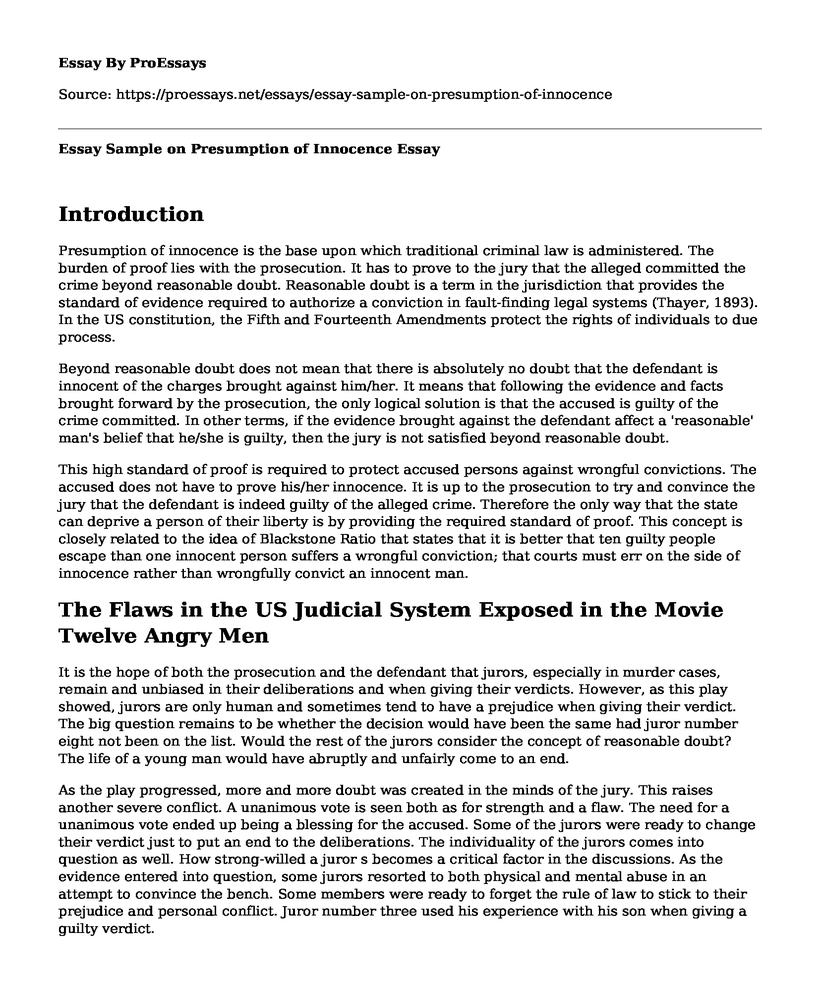Introduction
Presumption of innocence is the base upon which traditional criminal law is administered. The burden of proof lies with the prosecution. It has to prove to the jury that the alleged committed the crime beyond reasonable doubt. Reasonable doubt is a term in the jurisdiction that provides the standard of evidence required to authorize a conviction in fault-finding legal systems (Thayer, 1893). In the US constitution, the Fifth and Fourteenth Amendments protect the rights of individuals to due process.
Beyond reasonable doubt does not mean that there is absolutely no doubt that the defendant is innocent of the charges brought against him/her. It means that following the evidence and facts brought forward by the prosecution, the only logical solution is that the accused is guilty of the crime committed. In other terms, if the evidence brought against the defendant affect a 'reasonable' man's belief that he/she is guilty, then the jury is not satisfied beyond reasonable doubt.
This high standard of proof is required to protect accused persons against wrongful convictions. The accused does not have to prove his/her innocence. It is up to the prosecution to try and convince the jury that the defendant is indeed guilty of the alleged crime. Therefore the only way that the state can deprive a person of their liberty is by providing the required standard of proof. This concept is closely related to the idea of Blackstone Ratio that states that it is better that ten guilty people escape than one innocent person suffers a wrongful conviction; that courts must err on the side of innocence rather than wrongfully convict an innocent man.
The Flaws in the US Judicial System Exposed in the Movie Twelve Angry Men
It is the hope of both the prosecution and the defendant that jurors, especially in murder cases, remain and unbiased in their deliberations and when giving their verdicts. However, as this play showed, jurors are only human and sometimes tend to have a prejudice when giving their verdict. The big question remains to be whether the decision would have been the same had juror number eight not been on the list. Would the rest of the jurors consider the concept of reasonable doubt? The life of a young man would have abruptly and unfairly come to an end.
As the play progressed, more and more doubt was created in the minds of the jury. This raises another severe conflict. A unanimous vote is seen both as for strength and a flaw. The need for a unanimous vote ended up being a blessing for the accused. Some of the jurors were ready to change their verdict just to put an end to the deliberations. The individuality of the jurors comes into question as well. How strong-willed a juror s becomes a critical factor in the discussions. As the evidence entered into question, some jurors resorted to both physical and mental abuse in an attempt to convince the bench. Some members were ready to forget the rule of law to stick to their prejudice and personal conflict. Juror number three used his experience with his son when giving a guilty verdict.
Conclusion
As a young man from the slums, the lack of funds to hire a lawyer also meant the defendant had to make do with a court-appointed public defender. The desire of the public defender to fight for his client was also questioned as more weak evidence was challenged by juror number eight.
Had it not been for the brave actions of this juror, an innocent young man would have been wrongfully convicted of his father's murder.
References
Thayer, J. B. (1893). The origin and scope of the American doctrine of constitutional law. Little, Brown.
Cite this page
Essay Sample on Presumption of Innocence. (2022, Dec 08). Retrieved from https://proessays.net/essays/essay-sample-on-presumption-of-innocence
If you are the original author of this essay and no longer wish to have it published on the ProEssays website, please click below to request its removal:
- William Shakespeare's Venus and Adonis: Red and White
- Success Path Exploration in Poetry - Literary Essay Example
- TV Show Review: Into the Badlands - Leadership
- Richard Ramirez Crimes Case Study Paper Example
- Essay Example on Myths: Ancient Stories Explaining the Unimaginable
- Paper Example on Relative & Parallel Minors: B & E Majors' Rare Coincidence
- Essay Example on Social Media: A Crucial Part of Life







